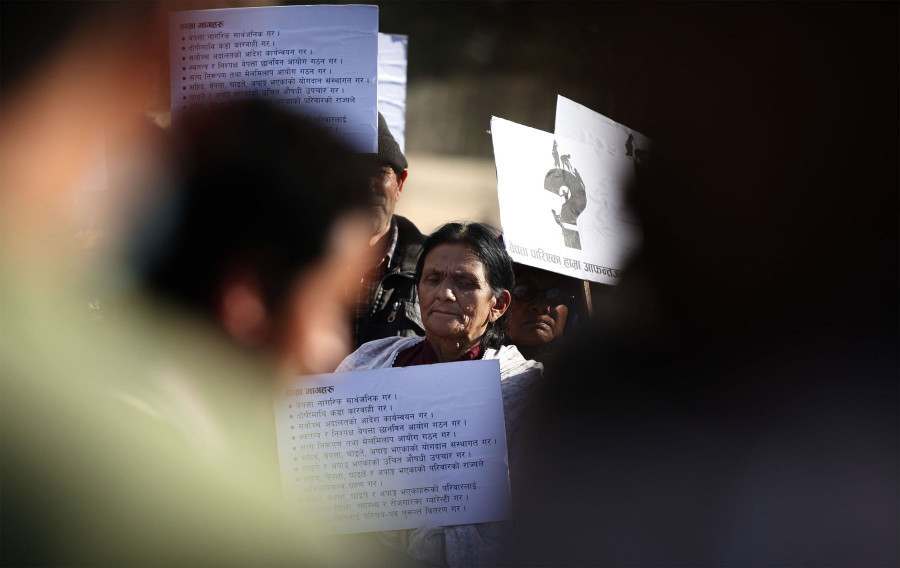National
Nepal has made little progress on transitional justice, Amnesty International Nepal says
The rights group says despite making numerous commitments at international forums, the country achieved little in terms of real delivery.
Post Report
Nepal has made no significant progress on transitional justice while there is clear regression on some fundamental human rights issues, as the country’s human rights record was reviewed last week at the UN Human Rights Council, a rights group said on Tuesday.
In a statement, Amnesty International Nepal said that even after five years from Nepal’s last Universal Periodic Review and more than 14 years after the end of the country’s decade-long armed conflict, victims continue to wait for truth, justice and reparations.
“Nepal has made numerous commitments at international forums but has achieved little in terms of real delivery,” Nirajan Thapaliya, director at Amnesty International Nepal, has been quoted as saying in the statement. “Since the second review in 2015, there has been no significant progress on transitional justice while there is clear regression on some fundamental human rights issues.”
Nepal’s decade-long armed conflict, in which 13,000 people lost their lives and thousands disappeared, ended in 2006 following a peace deal between then Maoist rebels and the government.
But it took nine long years to form the commissions to look into the insurgency-era cases.
However, even after six years, the progress in providing justice to the victims has been tardy, despite the government’s repeated commitments at home and the international forum to conclude the peace process “at the earliest.”
The third Universal Periodic Review cycle of Nepal was reviewed at the Human Rights Council in Geneva on January 21, as Minister of Foreign Affairs Pradeep Kumar Gyawali led the virtual delegation from Nepal.
Stating that Nepal had claimed there was significant progress on transitional justice during the second review in 2015 and the third review in 2021, Amnesty International Nepal has pointed at successive governments’ failure to amend the Enforced Disappearances Enquiry, Truth and Reconciliation Commission Act 2014 as ordered by the Supreme Court in 2014 and 2015, to bring them in line with international standards.
Pointing out the questions posed by member states to Nepal on many other human rights concerns, in addition to the unresolved issue of transitional justice during last week’s review, Thapaliya said, “Nepal must address the human rights concerns raised during the review and make necessary changes to laws, policies and practice.”
“The authorities must repeal the regressive provisions in a series of proposed laws that will likely compromise already guaranteed human rights,” said Thapaliya.
The statement added that various forms of freedoms remain under threat as the government has proposed a series of laws to restrict the right to freedom of expression and to detain individuals critical of the government.
“A series of draft laws including the Media Council Bill, the Information Technology Bill, and Nepal Special Service Bill proposed by the government in the past two years contain provisions that threaten to severely restrict freedom of expression and right to privacy,” said the rights body.
Amnesty International Nepal, in its statement, has also pointed out poor implementation of existing laws with some protection measures such as the laws on migrant workers’ rights, rights of the Dalits, women’s rights, and provisions relating to torture in the Penal Code.
“Despite enacting legislation to outlaw caste-based discrimination, violence and discrimination against Dalit people are widespread. Despite Nepal’s commitment to address torture and other ill-treatment, torture is widespread and the law is inadequate,” the statement reads.
The rights body has said that despite Nepal making commitment to ensure the effective functioning of the National Human Rights Commission in accordance with the Paris Principles during the 2015 review, there has been little action on the commission’s recommendations for prosecution of cases related to crimes under international law and human rights violations.
“On the contrary, in April 2019, the government proposed amendments to the National Human Rights Commission Act 2012 with measures that would undermine the independence and autonomy of the national rights body and limit its jurisdiction,” said the rights body.




 13.12°C Kathmandu
13.12°C Kathmandu













